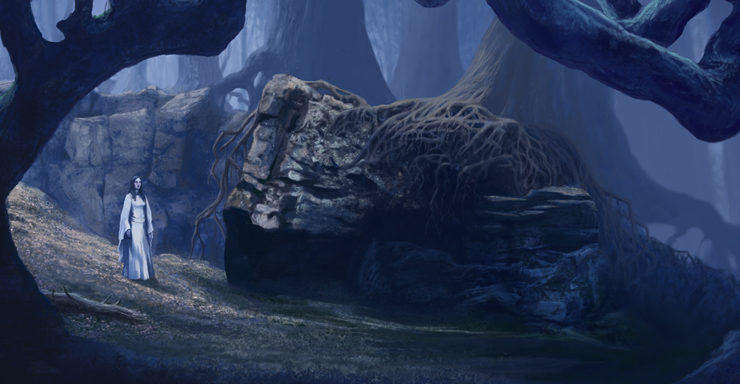In Which the King’s Sister Flies the Coop and Meets a Tall, Dark, and Handsome Stranger, Inadvertently Sowing the Seeds of Gondolin’s Destruction
The Hidden City of Gondolin is doing great. Peace has prevailed for years; the future looks bright. What can possibly go wrong? Was Ulmo full of baloney or was there something to his warnings about treachery? For once, we’ll stop discussing the doings of whole kindreds of Elves and zoom in on just one family in “Of Maeglin,” the sixteenth chapter of the Quenta Silmarillion. I’m pretty sure the titular character is the quietest and most understated Elf we’ve met thus far, but that’s all right. This is just his origin story.
Yet this chapter has more drama than you can shake a staff of doom at! It bears all the hallmarks of a classic soap opera: betrayals, bad relationships, unrequited love, baby daddies, giant spiders, and poisoned darts. And it ends like some lost stanza from Harry Chapin’s bittersweet classic “Cat’s in the Cradle.”
Dramatis personæ of note:
- Aredhel – Noldo, Turgon’s sis, jerk magnet
- Turgon – Noldo, Aredhel’s bro, King of Gondolin
- Eöl – Sinda, goth, armorsmith
- Maeglin – Mixed Elf (½ Sinda, ½ Noldo), Omen child
- Curufin – Noldo, fifth son of Fëanor, complete jerk
Of Maeglin
Two hundred more years of peace have rolled past, and the Hidden City of Gondolin has been kept both secret and safe from Morgoth and the world at large. Since the return of the Noldor to Beleriand, Turgon himself has gone from a sort of biding-my-time, kingly noble to a defending-what’s-mine noble King. And hopefully all these years Turgon hasn’t loved too well the work of his hands or the devices of his heart. Because, y’know, there’s a whole thing about that.
All this time he’s maintained his law that, for security reasons, no one who finds Gondolin—or more specifically, the valley of Tumladen where the great walled city sits upon its hill of stone—can leave again. Nor can anyone already within Gondolin leave it. And for the most part, everyone living here is content. Yet there is one who finally chafes at this self-imposed sanctuary: Turgon’s own sister, Aredhel, a princess who is called the White Lady of the Noldor and/or Gondolin—largely for always being clad in silver and white (though her hair is dark). She’s voiced her desire to get out more, and Turgon has basically said, “sorry, sis” every time.
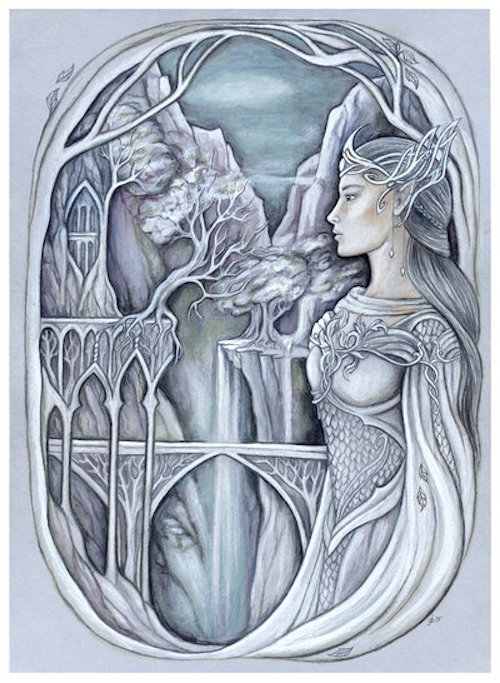
Like her cousin Galadriel, Aredhel is tall and strong, but she’s wilder and flightier. Neither woman is a shrinking violet: Galadriel is known for being headstrong but also wise, especially as the centuries pass, and if you go by what’s said of her in Unfinished Tales, she’s also markedly athletic. Aredhel shares many traits with her cousin, especially since we’re told that back in Valinor, she would go riding and hunting and could basically hold her own with her other cousins: the freakin’ sons of Fëanor.
And in that, we see the stark difference between the women: Aredhel is not always the best judge of character (while Galadriel very much is). I mean, where her brother Fingon is friends with one of the more decent sons of Fëanor (Maedhros), Aredhel consorts with the nastier ones, too. At least she used to. She misses them now—despite their complicity in that ship-burning episode, I guess. Perhaps she, like many of the grandkids of Finwë, simply forgives easily.
But now she’s in Gondolin—and has been for a couple hundred years. She understandably desires to ride in open fields and wild lands and great forests, but she’s constrained by tall walls and high mountains. I’m pretty sure the valley of Tumladen includes plenty of meadows and pastures, but for an immortal Elf, two centuries “exploring” the same old fields gets old fast. She’s restless, and seems to possess a wanderlust that her brother (and nearly every other Elf) doesn’t share, and frankly it’s amazing she waits this long before putting her foot down. This valley is beautiful and all, but it’s comparatively small. Beleriand beckons!

Turgon gives her grief over this, but she doesn’t relent. At last he agrees, but fears that bad things will come of it and says as much to her. Then he tries to dictate where she can go (northwest into Hithlum to visit their bro, Fingon), but she counters:
I am your sister and not your servant, and beyond your bounds I will go as seems good to me. And if you begrudge me an escort, then I will go alone.
It’s typical sibling stuff, actually. He wasn’t going to begrudge her armed company but she says it like he was going to. But he does suggest that while he trusts her to keep Gondolin’s location a secret, he can’t fully trust anyone else. Nevertheless he sends with her three lords (no mere run-of-the-mill guards) and a buttload of warnings about Morgoth and the dangers of the world “of which the Lady knows nothing” and blah blah blah. Which isn’t that fair. Aredhel endured the Helcaraxë hellscape with him and all the rest. She’s no homebody and never has been.
Still, her sojourn abroad doesn’t go especially well, because of course it doesn’t. First she changes course, telling her escorts she will not go to Hithlum but wishes instead to seek out the sons of Fëanor…because that sounds like a fantastic idea. They come to the northern edge of Doriath, seeking to pass through, but the border guards of Thingol’s realm won’t let them in. Aredhel is of the house of Fingoflin, but the only Noldor allowed in (even if only to pass through) are those of the house of Finarfin. Thingol is still pissed at the Noldor for the Kinslaying; sorry, Aredhel, you’re not family. The guards say that if she wants to visit the lands where Fëanor’s sons govern, they’re going to have to go around Doriath. Which means taking either the perilous northern route (exciting!) or the safer but much longer southern route (borrrring).
So Aredhel and her escort take the northern “short cut” through Nan Dungortheb. You know, the Valley of Dreadful Death! And no surprise, somewhere along the way they become “enmeshed in shadows”—the vestigial remains of old Ungoliant and her gloom, perhaps. Or at least it’s the work of her foul offspring. These cloying shadows separate the lords from their lady, which is probably fine by her. They were kind of cramping her style anyhow. They dutifully try to find Aredhel again but instead find themselves set upon by spider monsters—you know, Shelob herself might very well be one of them!—and it’s all they can do to escape the Valley of Dreadful Death alive. When these Elf-lords return to Gondolin minus their charge, you can guess what Turgon thinks, as both a king and a brother.
Aredhel never turns back, though; she presses on, for she is “fearless and hardy of heart” like all the descendants of Finwë. She does eventually make it to the lands where Celegorm and Curufin are lords, but they’re not home. Why? Because they’re off riding in the lands of their brother Caranthir. Which is interesting, since that’s an activity other than pursuing “with vengeance and hatred to the ends of the World” any who would hold, take, or keep a Silmaril. You know, like that Morgoth guy who’s just a hop, skip, and jump to the north and happens to have three Jewels of Fëanor? But no, I’m sure galavanting through Thargelion or Dor Caranthir or wherever is super important, too.
Still, Celegorm and Curufin’s people welcome Aredhel and tell her to hang out and wait for their lords’ return. Happy to have such open space again, she’s happy…for a little while. But she’s a restless spirit. And those two C-brothers sure are tarrying a while over with their other C-brother. A whole year goes by and still they haven’t returned. So Aredhel does what Aredhel does: goes riding off again, and alone. Eventually her ever-widening trips brings her to the forest of Nan Elmoth…
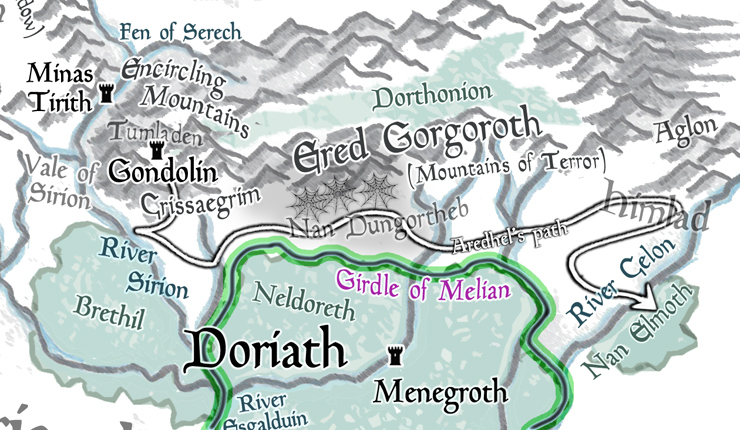
Now we’ve heard of this forest before. It’s where a certain Teleri lord once known as Elwë also went wandering alone, a long, long time ago. You remember, the one who then became entranced by Melian, tarried quite a while, and finally returned to his sundered people with the name Thingol. It’s a forest for getting lost and hitched, I guess, because when Aredhel comes wandering in she, too, is about to find a mate. But this time it’s not so romantic. It’s certainly not love at first sight.
Thus we are introduced to Eöl, a Teler who’s called by many the Dark Elf. (And that’s pronounced, appropriately, A-höle, minus the “h.”) Right away it’s helpful to understand that Eöl is called the Dark Elf on top of his being one of the Moriquendi—which all the Sindar (who are ex-Teleri) of Middle-earth are, not having seen the light of the Trees of Valinor. They’re all technically Dark Elves, but Eöl really lives up to the epithet by actively shunning the Sun. Clearly he was a bigger fan of starlight; he favors the night, lives deep in Nan Elmoth where the forest canopy is so thick that the sunlight doesn’t penetrate—we’re talking Mirkwood-level sunlessness. On top of that, he goes around in black metal armor that he forged himself, for we’re told…
he devised a metal as hard as the steel of the Dwarves, but so malleable that he could make it thin and supple; and yet it remained resistant to all blades and darts. He named it galvorn, for it was black and shining like jet, and he was clad in it whenever he went abroad.
It’s so badass that I kind of wish this special material wasn’t just a tertiary aspect of this story, because it’s kind of the only cool thing about this guy.
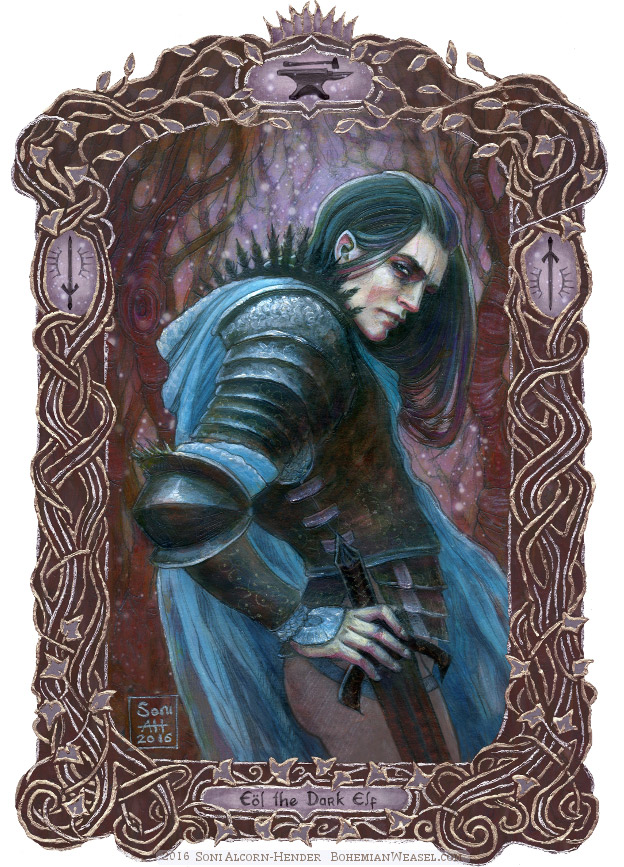
Because Eöl is not a nice guy.
Not by any stretch. He makes all goths look bad. On the one hand, if you’re an Elf, then Eöl is a reminder that you don’t need to be under the Doom of Mandos to go wrong. But on the other hand, Eöl does involve himself with the Noldor so it might just be that some of that doom rubs off onto him.
A few quick facts about Eöl:
- He’s a kinsman of Thingol’s, so he’s of high-born Teleri stock. And while that means he’s some kind of noble among the Sindar, he’s not royalty, not an heir to anything of note. Which might be a first; most of the Elves we’ve met so far have had important birthrights. But Eöl is more of a self-made Elf.
- He hates the Noldor, blaming them for Morgoth’s presence in Beleriand and clearly takes deep offense over the Kinslaying he’s heard about.
- He gets along with the Dwarves really well and first learned his trade from them. In fact, he likes Dwarves more “than any other of the Elvenfolk of old.” He’s not a Elf-people person.
- He’s a legendary smith; metalworking skills of his calibar being quite rare for Eldar who aren’t Noldor.
- He actually left Doriath when the Girdle of Melian was woven around it. Apparently he was too cool for her protection.
- On his way out, he gave Thingol an amazing sword which he’d forged in exchange for taking up this abode in Nan Elmoth. Eöl holds a grudge about the exchange, but alas this sword—made of extraterrestrial material!—actually doesn’t feature in this chapter at all. It’ll show up in some eighty-odd years, though.
For all Eöl’s shunning of the Noldor, he makes one very clear exception when he spies Aredhel wandering into his woods. He sees quite well in the dark, so when the White Lady of the Noldor—who literally is “never arrayed but in silver and white”—strays near his domain, there is no missing her. Immediately drawn to this “gleam of white in the dim land,” Eöl wants her as a new possession. So here he goes from tall, dark, and goth Teleri-smith to underhanded, magic-weaving stalker-Elf.
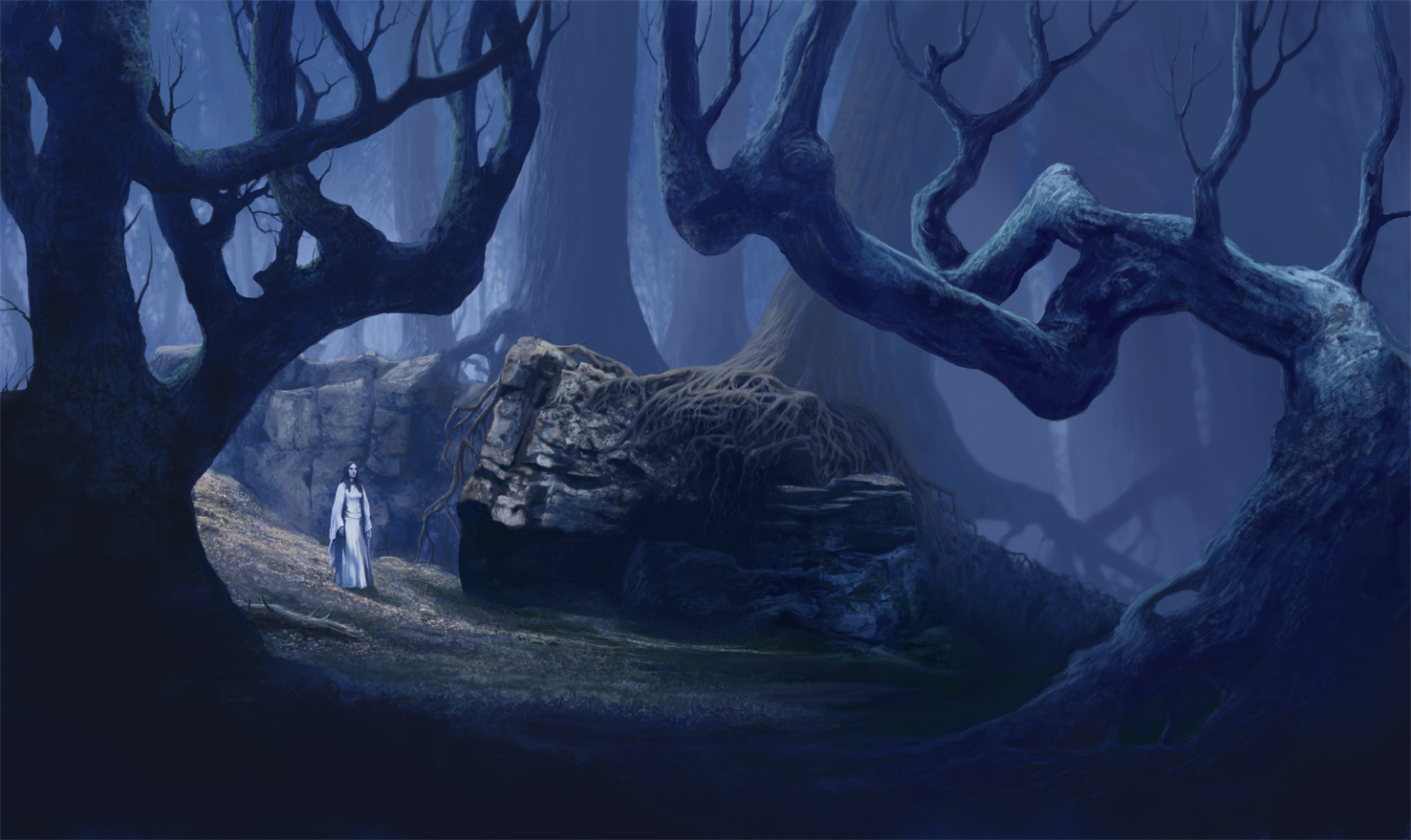
and he set his enchantments about her so that she could not find the ways out, but drew ever nearer to his dwelling in the depths of the wood. There were his smithy, and his dim halls, and such servants as he had, silent and secret as their master.
Eöl has enchantments! So Eöl is maybe some sort of multiclassed magic-user/smith? The very concept of magic in Middle-earth, especially the Elves’, is always tricksy. Because it’s kind of everywhere all the time, and is often as pervasive as the natural world itself; see Galadriel’s words to Sam and Frodo on the subject. Moreover we’re told that ever since the meeting of Melian and Thingol in Nan Elmoth, enchantments “lay upon it still.” So it’s possible that Eöl has some sort of sorcery of his own, but I’d say it’s just as likely that he’s learned to manipulate the existing power of this forest for his own purposes. Maybe he chose it for this reason?
And when Aredhel, weary with wandering, came at last to his doors, he revealed himself; and he welcomed her, and led her into his house. And there she remained; for Eöl took her to wife, and it was long ere any of her kin heard of her again.
Yup, that phrase—you know which one I mean—doesn’t sit too well, does it? It probably shouldn’t. It’s an archaic phrase, though I don’t think it’s normally meant to be as disturbing as it sounds here. But it’s at least worth pointing out that this exact wording is used a second time much later in The Silmarillion. Except on that second go-round, the words “against her will” are added, making the implication all the worse. But as Tolkien is always deliberate with his wording, I think that distinction is important.
Still, everything feels a little backwards with Eöl. Take Aragorn, Thingol, and soon enough Beren (in Chapter 19), with whom we’re accustomed to a certain fairytale pattern in Tolkien’s world: some noble dude strays into an enchanted forest, spots a girl, and is literally dumbstruck by her beauty. But then actual mutual and unimpeachable love sets in, making their relationship as genuine as they come. But with Eöl it’s twisty, it’s reversed. The girl strays into his woods, he ensnares her with his trickery, and though the attraction seems real enough, the love itself is questionable. Like some kind of effed-up Beauty and the Beast scenario.
Now, of her staying with Eöl and becoming his wife:
It is not said that Aredhel was wholly unwilling, nor that her life in Nan Elmoth was hateful to her for many years.

That wording falls just short of an indictment on Eöl. If Aredhel is not wholly unwilling, then she is not wholly consenting, is she? Either way, relationship skulduggery is afoot. While Aredhel’s volition is not denied here, her choice is ill-considered.
And now she is trapped again. But instead of being confined in bright and expansive walls under an open sky, now she’s in closer quarters, dwelling in deep halls where daylight literally cannot reach. At “Eöl’s command she must shun the sunlight,” and the closest thing we get to romance in their marriage is that they wander together under the stars (which isn’t nothing, the Eldar are still the People of the Stars) and under the light of the sickle moon (which, geez, actually suggests that Eöl doesn’t even like the full moon!). So Aredhel can still venture out alone, but she must do so in the dark. Yet again, family is telling her where she can and cannot go. By comparison, Turgon and his magnificent city don’t seem so bad, but like her brother, Eöl is forbidding her to seek the sons of Fëanor.
And then they have a kid together. A boy. Maeglin (MY-glin) is the name he’s given by Eöl, which we’re told means “sharp glance” in Sindarin. But I guess that’s better than “looks askance,” “throws shade,” or “stink-eye.” The boy is goth and grim like his father, with dark hair and pale skin, though he mostly takes after his mother’s side of the family when it comes to face and body. Given the disposition of Eöl and the restlessness of Aredhel, he’s bound to have some tense family portraits.
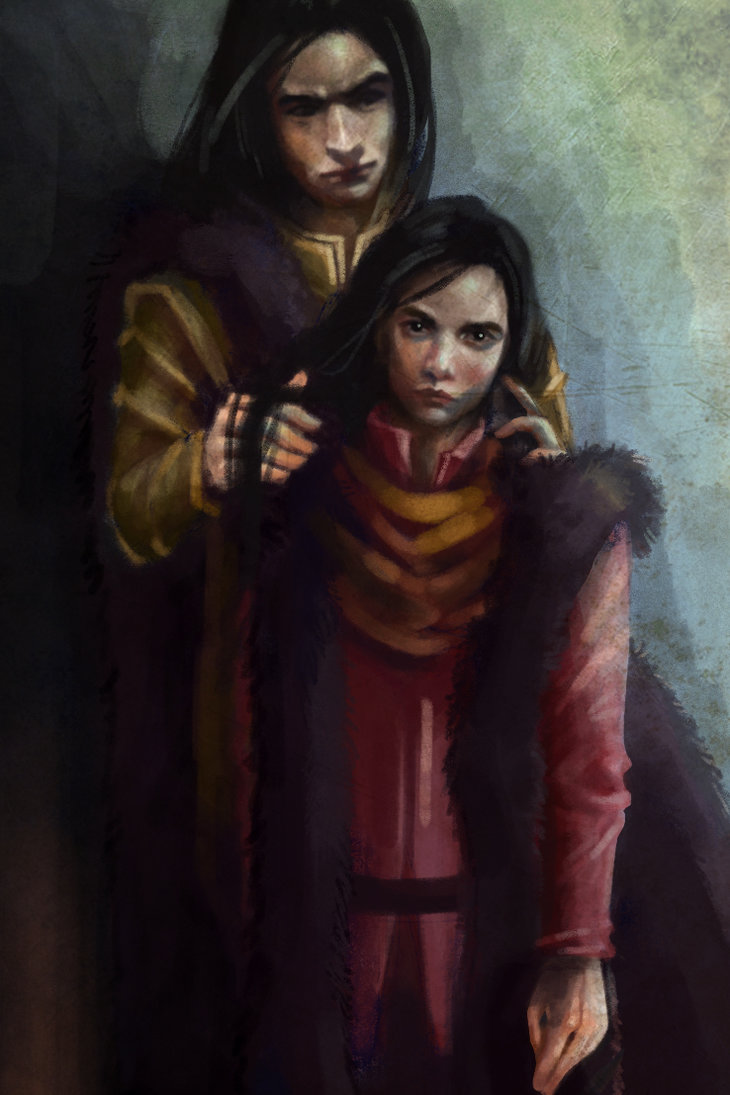
Still, the boy’s got some exceptional parents, so he becomes a gifted young man, whose talent for words is powerful but seldom used. As Maeglin grows up, Eöl doesn’t win any Father of the Year awards. They never join any father and son three-legged races at any company picnics, if you know what I mean. (Though I’m totally imagining normal Sindarin dads actually doing this now.) One thing Eöl does do is take Maeglin on Bring Your Son to Work Days, specifically to the cities of the Dwarves, Belegost and Nogrod in the Blue Mountains, where they hone their smithing skills. I imagine Eöl running some workshops and maybe giving a seminar about how awesome he is for inventing the galvorn alloy. But still, his bringing Maeglin on these trips doesn’t seem like affection; it seems like business. Like his son is an investment. Maeglin learns his father’s trade of crafting and forging—but especially of finding ores in the mountains.
Maeglin does love his mom, though. Let’s be clear on that. Whenever Eöl isn’t around, he gets her to tell him stories of her past. And remember, she was born in Valinor; her upbringing couldn’t be more different than his. When she was a little Elf-girl, she might well have gone running barefoot through the green grass beneath the Two Trees themselves, and she certainly saw the Valar and their illustrious works with her own eyes. But sadly, too much of Eöl and his selfishness also exists in Maeglin; when his mom talks about the Hidden City and about her brother Turgon, he homes in one important fact: the King of Gondolin has no son. Turgon has a daughter, Aredhel has pointed out, but the kingship of the Noldor typically passed to sons. “Tell me that story again, Mommy,” Maeglin might as well be saying. “The one about the secret city of High Elves and its heirless king where maybe a lost nephew can grow up and rule in his place… Tell me again.”
Nostalgia is a powerful thing. Aredhel’s own storytelling reminds her how unhappy she is with Eöl and his dark halls and how awesome her life had been before coming to Nan Elmoth. What was she thinking leaving sun-lit Gondolin and its open skies? Meanwhile Maeglin tries to scare up secrets from her so he can learn how to find Gondolin. But Aredhel keeps her promise to her brother and does not reveal it, not even to her son.
And when Eöl himself learns of his son’s budding interests in the Noldor, he tries to stamp those dreams out real quick.
You are of the house of Eöl , Maeglin, my son, and not of the Golodhrim. All this land is the land of the Teleri, and I will not deal nor have my son deal with the slayers of our kin, the invaders and usurpers of our homes. In this you shall obey me, or I will set you in bonds.
Maeglin doesn’t back talk. He doesn’t talk at all. He’s got that horror-movie-child creepiness, all eyes and stares and only seldom-spoken words. And at this point Eöl stops bringing his son on business trips, too. Almost like he doesn’t want the boy seeing any more of the wider world. Aredhel and Maeglin are now both prisoners, after a fashion. They can still go out riding in the woods (at night only, remember), but that’s it. Eöl has put his foot down. See, it’s Eöl’s way or the highway the shackled way.
But Aredhel and Maeglin are descendants of Finwë, aren’t they? They’re fearless and defiant. One midsummer, the Dwarves invite Eöl to a feast in Nogrod, and like a nitwit he goes and leaves his wife and kid home. That’s when Maeglin convinces his mom to leave once and for all. To leave for Gondolin…together. Which for Aredhel, who misses the freedom she once had and the love of her family and people, is enough. Plus Maeglin’s words are powerful, even to her. So Aredhel lies to Eöl’s household servants, saying that she and her son are going out to visit the sons of Fëanor—then they totally don’t do that and instead ride west just outside the border of Doriath.
She’s headed home.
But Eöl gets home sooner than expected and discovers that Aredhel and Maeglin have both defied him and run off to see her treacherous Noldorin kin—worse, those bastard sons of Fëanor! But in the pursuit—which we know he’s totally pissed about, being made to ride out under that accursed Sun the Eldar are so gaga over these days—he’s spied by Curufin’s own border patrol and they bring him in. The scene that follows, wherein Curufin and Eöl trade razor-sharp words of thinly-veiled derision when really they’d both clearly rather duel, is a delight. You don’t often get two antagonists going at each other in the Silmarillion.
What I find most interesting about this exchange is Curufin’s loyalty to Aredhel—well, he was a friend to his cousin in years long past—and his strict observance to the customs of the Eldar. (Which are actually written about in great detail in Morgoth’s Ring.)
‘Do not flaunt the title of your wife before me,’ he said. ‘For those who steal the daughters of the Noldor and wed them without gift or leave do not gain kinship with their kind. I have given you leave to go. Take it, and be gone. By the laws of the Eldar I may not slay you at this time. And this counsel I add: return now to your dwelling in the darkness of Nan Elmoth; for my heart warns me that if you now pursue those who love you no more, never will you return thither.’
Which is haughty quip, a threat, and a sick burn all rolled into one.
Eöl plays it cool, despite his loathing for the Noldor generally and now Curufin specifically. But from this Elf-style chest-beating battle, Eöl learns that Aredhel and Maeglin didn’t come this way at all but went west. And now he understands that his wife and kid are trying to quit him for good. His wrath is stoked. Thus, he races off after them, pursuing them with vengeance and hatred (for the Noldor) to the ends…of…. Huh, yeah. Eöl is kind of the Sindar’s answer to Fëanor, isn’t he? Only his desires and possessions matter most.
So the chase is on!
But “by ill fate” at the crossing of the River Sirion (still #1 on Ulmo’s list!) “they were betrayed,” because the horses of Aredhel and Maeglin neigh good and loud—and Eöl’s own steed, hearing this, makes a beeline for them. That’s when Aredhel’s insistence upon always wearing white dooms her and possibly all of Gondolin, for keen-eyed Eöl spots her from afar. Now that she’s marked, he’s able to follow her to the secret paths into the city.
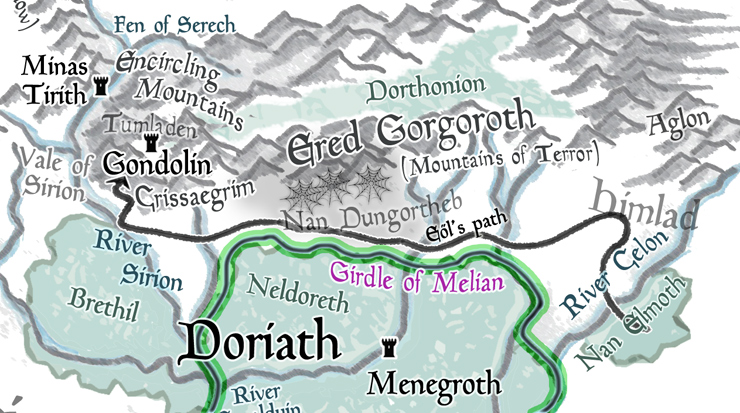
Aredhel is approached by the Gondolindrim sentries, and passes through the Seven Gates—the totally amazing mountain gates detailed in Unfinished Tales but not in this book. When she and her son are brought to Turgon, the King of Gondolin is overjoyed. His sister is all right! And she’s got a son!? Well, all right, he seems like a good kid. Turgon is stoked, and now everything is going to be awesome from now on, surely!
Maeglin, meanwhile, finds Gondolin to be even more splendiferous than his mother’s stories portrayed it. He pledges himself to his uncle and just drinks it all in. He also meets Idril, Turgon’s daughter, who is Maeglin’s cousin. She is golden-haired like her mom was, which means in this moment we learn that Elenwë, Turgon’s wife who died in the Grinding Ice, was of the Vanyar! She might have been the only Elf not of the Noldor who set out on their march of exile, too! Huh! More’s the shame. Well, Maeglin is smitten with her, and “seemed to him as the sun from which all the King’s hall drew its light.” And that’s lovely and all but she’s his cousin.
Soon enough, as we knew he would, Eöl creeps into the secret paths that lead into the valley. This is precisely the sort of thing Turgon has been afraid of for well over two hundred years. Well, Gondolin is not only hidden but exceedingly well guarded. Eöl may be “the Dark Elf” but the sentries spy and capture him. They were going to slay him outright, for he is a stranger and Turgon’s laws are quite clear on the matter. But. BUT! Elves are polite and obviously allow him to speak first, at which point he claims that Aredhel—the White Lady of Gondolin who is totally their biggest celebrity—is his wife. And this gives them pause. The Guard report this unprecedented development to Turgon, pointing out how difficult their captive is to manage and explaining precisely why they didn’t slay him.
Aredhel confirms Eöl’s identity and assures her brother that she did not intentionally lead Eöl to Gondolin. She hides nothing, although she sure could have mentioned her goth husband when she first arrived. It’s not like Maeglin came out of nowhere. So Eöl is brought before Turgon on his throne.
What comes next is one of the most arrestive exchanges in the book, not to mention the most dramatic. If this was a film or TV show and you didn’t know what was going to happen next, you’d be at the edge of your seat. As always, Tolkien eloquently crams so much into so little. And he really is great at selling different points of view. Both Eöl and Turgon make excellent points, even though both are being harsh and obstinate to a degree. When each Elf speaks, you get where he’s coming from, but at the same time, the pride of both escalates until Eöl crosses the line.
They’re all gathered together. Aredhel is there, Maeglin is there, and obviously a bunch of the king’s guards. Turgon is immediately welcoming. He calls Eöl kinsman, legitimizing the marriage of Eöl and Aredhel without question (which even Curufin did not), but he will make no exceptions for his law: that “none who finds the way hither shall depart.”
Eöl unloads on Turgon with his—shall we say—extreme distaste of the Noldor. This is Teleri land, he claims, which the Noldor have tried to seize for their own and set borders around (I mean, he’s not wrong.) He claims they’ve only brought war (sure, but against freakin’ Morgoth) and “all unquiet” (oh snap!). Eöl hasn’t come to spy or reveal secrets, only to claim his property. Yeah, to Eöl his wife and his kid are property. But he’s fine with Aredhel staying—what a terrible wife she is, after all, trying to be more than mere goods and services to him. He even throws this barb at her:
let the bird go back to the cage, where soon she will sicken again, as she sickened before.
He’s being an ass—despite the grains of truth—but also a hypocrite. Gondolin, if it is a cage, sure is a bright and opulent one; much nicer and full of friendlier people than that dark little cage of his making. But sure. He demands that Maeglin be given to him, then literally turns to his son and commands him to follow. Caring nothing for Turgon’s laws, Eöl insists they’re both going to leave.
Which the King isn’t going to stand for on either account: Eöl isn’t going anywhere, and he isn’t making Maeglin’s choices for him. Not cool, man.
Then Turgon sat in his high seat holding his staff of doom, and in a stern voice spoke: ‘I will not debate with you, Dark Elf. By the swords of the Noldor alone are your sunless woods defended. Your freedom to wander there wild you owe to my kin; and but for them long since you would have laboured in thraldom in the pits of Angband. And here I am King; and whether you will it or will it not, my doom is law. This choice only is given to you: to abide here, or to die here; and so also for your son.’
The staff of doom has spoken! Personally, I’m a little bummed that “staff of doom” isn’t a proper noun. The Dungeon Master in me desperately wants to know what powers it has…but yes, yes, I know it’s just a symbol of his authority, though Tolkien could at least have given us a short description of it.
Then shit gets real. First Turgon and Eöl have a stare-off, and then, “swift as a serpent,” Eöl reaches under his cloak and whips out a javelin! First of all, after this, Turgon is definitely going to implement a new frisking policy on visitors, but also, how small is this thing? A javelin is a light and usually short spear, but that can’t be too easy to conceal unless you’ve got a very long cloak. Which he might just have, being goth and all.
You’d think that Eöl, sneaky Dark Elf that he is, would play along and just say “Fine,” then contrive some sort of stealthy exit from Gondolin with Maeglin in hand. But no, he chooses the path of violence. So okay, then you’d think Eöl would maybe be spiteful and hurl his javelin at Turgon, the King, and take down one of the lofty Noldor lords he so despises. But nope, he instead tries to murder…Maeglin!?
To call this a dick move would be to egregiously understate it. This is his kid. I mean, sure, if he’s not planning on staying in Gondolin, if he favors his pride above all, then Eöl knows he’s headed for death anyway. But he tries to take his son with him, and even says as much in an incredibly hasty speech. It’s the old if I can’t have him, no one can crime. Eöl may not have as bloody or enduring a legacy as Fëanor, but in this one brief moment he somehow upstages the eldest son of Finwë. Even Fëanor wouldn’t have tried to kill one of his own kids. Like I said from the start: total A-höle.
But opposite him in every way is Aredhel, who throws herself into the path of his javelin and takes the hit instead. Right in the shoulder. Just a flesh wound, one hopes. And of course all of the King’s guards take Eöl down and haul him away. And what does Maeglin say to this? Nada. This kid’s silence is deafening and creepy as hell. It’s one thing if you don’t react to your dad’s attempted murder of you, but another to say nothing when your mom is struck instead.
They decide that Eöl will face Turgon’s judgement the very next day, but the two women—Aredhel and her niece, Idril—are the only ones who speak on his behalf, asking for mercy. (Very Nienna-like of them.) But not Maeglin.
Then things get worse. Turns out the javelin was poisoned, and Aredhel sickens during the night; they hadn’t known it until she is too far gone, lost in darkness. And then it’s the Halls of Mandos for the White Lady of the Noldor.

So that talk of mercy? Nope, Turgon’s fresh out. His sister has been slain by this trash-talking Dark Elf. The next day he has Eöl taken to the north end of the city, where a sheer black cliff drops off at the high wall. Executions in Gondolin are unheard of, but when there’s got to be one, it’s not going to be a noose or sword, just a whole lot of onrushing ground. Maeglin continues to just watch in stony silence, which to me is like him singing (and sarcastically):
But it’s sure nice talking to you, Dad
It’s been sure nice talking to you
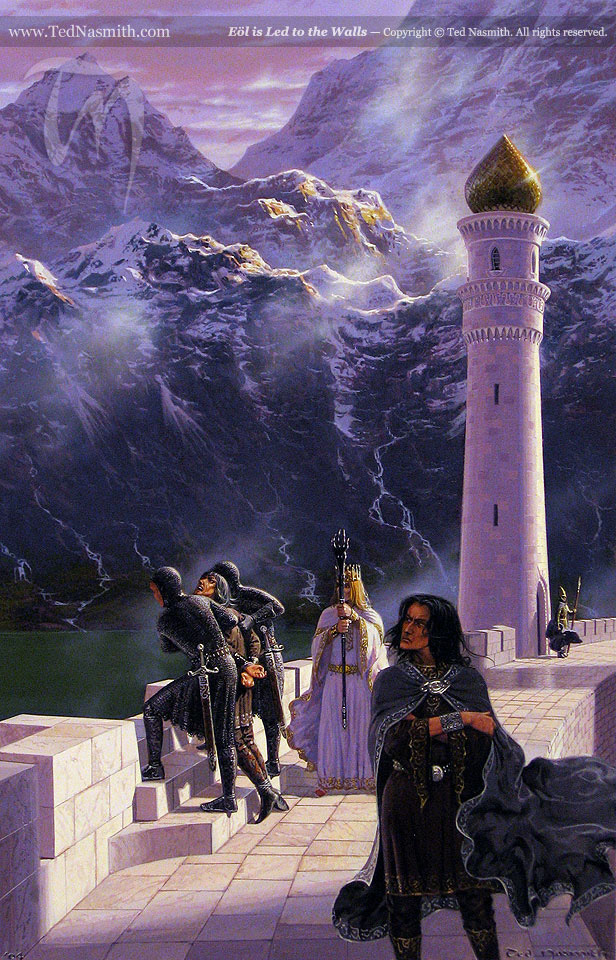
So Eöl says his last words:
So you forsake your father and his kin, ill-gotten son! Here shall you fail of all your hopes, and here may you yet die the same death as I.
In this, one hopes he’s not foresighted like some other just-about-to-die Elves have been in The Silmarillion…but it sure sounds ominous. What’ll become of Maeglin for real? We’ll see!
And then it’s time for Eöl to take a long walk off a short pier…or parapet, as the case may be. He might still be clad in his black galvorn armor even now, but it’s very clear that while it can stop blades and arrows, it is of no protection against the stony and swiftly approaching valley floor.

Maeglin still has nothing to say, but this chapter is just about his beginnings. We’re told that he “prospered and grew great among the Gondolindrim, praised by all,” and was “high in favour of Turgon.” Of course he’s all the King has left of his baby sister. But Maeglin, we may remember, is of sharp mind. When he does speak, people listen. And his skills are great. He brings all his talents to bear in the days to come, to impart his smithing know-how to those who would learn. He goes off into the nearby Encircling Mountains, finds all kinds of metals, and helps the Elves build up their arsenal. So despite the Damien-like vibe he emits in this chapter, he’ll still be a boon to Gondolin for a long, long time.
“Spoiler” Alert: There’s going to be a “dread year” at some future point where true war breaks out in Beleriand, and Maeglin will go with his uncle to fight in it. He’s not a reclusive, stay-at-home Elf; in fact, he’ll be “fell and fearless in battle.”
But remember, from the start Maeglin had been ambitious. Quietly so. And upon coming to Gondolin, Idril caught his eye…as did the political power that an alliance with her might grant him. He reveals this to no one, but nurses a growing infatuation with her “without hope.” Without hope because he knows that by Eldar custom one does not simply marry one’s cousin. Idril herself is perceptive, and aware of his secret desire for her. And she rightly finds it “crooked,” and that it will lead to nothing good. She’s pretty much the only Elf of Gondolin not sold on Maeglin being a great guy, too.
Tolkien explicitly tell us at the very end of the chapter that “a dark seed of evil” is sown, with Maeglin unable to have the girl he wants and therefore seeking his will, and power, in other ways. Doesn’t bode so well for Gondolin, does it?
And somewhere far away, in the Halls of Mandos at the western edge of Aman, the spirit of Eöl no doubt sits in his purgatory. And one hopes he’s not quietly singing to himself:
And as I fell from the wall it occurred to me,
He’d grown up just like me
My boy was just like me
In the next installment, which tackles the chapter “Of the Coming of Men into the West,” we’ll find out what those Secondborn are up to, toward which cardinal direction they venture, and which Elf (other than Fingon) plays a mean harp. Or a rude one, anyway.
Top image from “Aredhel” by Stefan Meisl
Jeff LaSala, who would totally bring his son on business trips to Dwarf cities, apologizes on behalf of all dads for Eöl. What a jerk. Tolkien nerdom aside, Jeff wrote a Scribe Award–nominated D&D novel, produced some cyberpunk stories, and now works for Tor Books.










